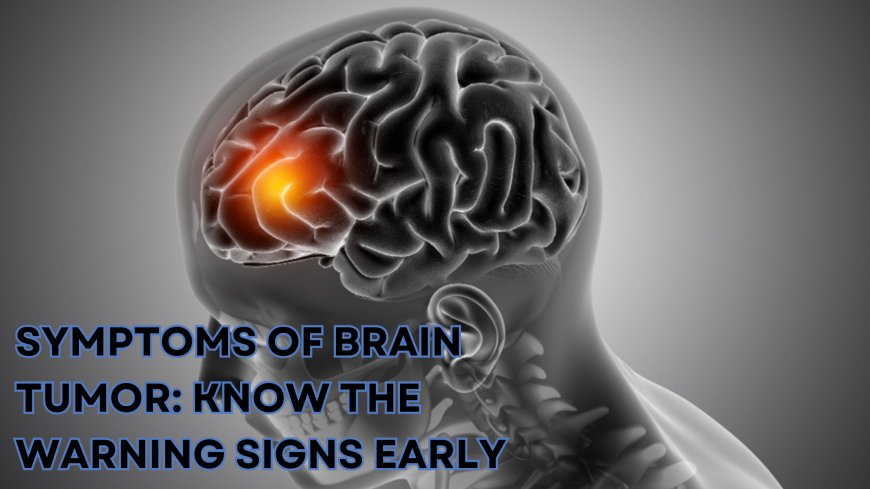Symptoms of Brain Tumor: Signs You Shouldn’t Ignore
Learn the early and advanced symptoms of brain tumor. Spot the signs early to act fast. Understand how symptoms of brain tumor affect daily life.

Symptoms of Brain Tumor: Know the
Warning Signs Early
A brain tumor is an abnormal growth of cells in or around your brain. These tumors can be benign (non-cancerous) or malignant (cancerous), but both types can disrupt brain function. The brain controls everything from movement and memory to vision and speech, so even a small tumor can have a significant impact. Symptoms often vary depending on the tumor's location and size, and may include headaches, nausea, vision problems, seizures, or changes in personality.
Think of the brain as a busy city, with roads, power lines, and communication hubs working in harmony. A tumor is like a roadblock or power outageit causes traffic jams and confusion, interfering with the brains smooth operation. Early diagnosis and treatment are key to managing brain tumors effectively. If you or a loved one is experiencing unexplained neurological symptoms, consulting the Best Neurologist in Jaipur can help ensure timely and expert care.
2. Why Symptoms Vary
Not all brain tumors act the same way. Their location, size, and growth rate play a huge role in how symptoms show up.
-
Location: A tumor in the frontal lobe may cause personality changes, while one near the cerebellum may affect balance.
-
Size: Larger tumors press harder on brain tissues.
-
Speed of growth: Fast-growing tumors cause sudden symptoms, whereas slow ones may develop subtly over time.
3. Persistent Headaches
Headaches are one of the most common symptoms of brain tumorbut not all headaches are serious.
Key warning signs:
-
Headaches that are worse in the morning
-
Pain that gets worse with activity or coughing
-
Headaches that dont improve with usual medications
If your headache feels different than usual and comes with other symptoms, it might be time to take a closer look.
4. Seizures and Convulsions
Even if youve never had epilepsy, a brain tumor can trigger seizures. This happens when the tumor disrupts the brain's electrical signals.
Types of seizures include:
-
Generalized seizures: Whole body shaking
-
Focal seizures: Twitching or numbness in one area
If you experience a seizure for the first time, seek emergency medical attention.
5. Memory Problems and Confusion
Have you been forgetting things more than usual or struggling to focus?
Symptoms include:
-
Short-term memory loss
-
Difficulty concentrating
-
Getting lost in familiar places
-
Confusing names or dates
These issues may seem minor at first but could signal deeper neurological problems.
6. Personality and Behavioral Changes
You might think, "Im just moody today," but drastic personality changes can be a red flag.
Look out for:
-
Sudden irritability or aggression
-
Apathy or loss of interest in activities
-
Risk-taking behavior
-
Social withdrawal
If someone close to you seems not quite themselves for a while, encourage them to see a doctor.
7. Nausea and Vomiting
If you find yourself vomiting without a clear reasonlike food poisoning or stomach fluit could be linked to increased pressure in the brain.
Signs to notice:
-
Morning nausea without other digestive symptoms
-
Vomiting accompanied by headache or blurred vision
This combination often points to something affecting the brain.
8. Vision and Hearing Issues
Brain tumors can affect the optic nerve or areas responsible for sight and hearing.
Symptoms include:
-
Blurred or double vision
-
Loss of peripheral vision
-
Ringing in the ears (tinnitus)
-
Sudden hearing loss
If your eye doctor cant explain changes in vision, its worth digging deeper.
9. Loss of Balance or Coordination
Do you suddenly feel clumsy, or have you been tripping over things?
Common signs:
-
Difficulty walking straight
-
Trouble with hand-eye coordination
-
Dizziness
These can point to tumors near the cerebellum, which manages movement and balance.
10. Speech Difficulties
If youre struggling to find the right words or slurring speech, it might not just be fatigue or stress.
Symptoms to watch:
-
Difficulty speaking clearly
-
Trouble understanding language
-
Repeating the same words unintentionally
These are especially concerning if they appear suddenly.
11. Weakness or Numbness
Tumors that press on motor pathways can cause physical weakness or numbness, often on one side of the body.
Common issues:
-
Weak grip
-
Drooping facial muscles
-
Difficulty lifting limbs
Sometimes, these mimic stroke symptomseither way, it's a medical emergency.
12. Sleep Disturbances
A brain tumor can mess with your natural sleep-wake cycle.
What you may notice:
-
Unusual sleepiness during the day
-
Trouble falling or staying asleep
-
Restless or fragmented sleep
These symptoms might not seem alarming alone but are crucial when paired with others.
13. Hormonal Imbalances
Tumors near the pituitary gland can cause hormonal disruptions, affecting everything from your weight to menstrual cycles.
Possible symptoms:
-
Unexplained weight gain or loss
-
Irregular periods
-
Low sex drive
-
Fatigue
If your hormone levels seem off, a scan might help get to the root cause.
14. When to See a Doctor
So, when should you be concerned?
If you experience more than one of these symptoms, especially if theyre getting worse or happening together, dont ignore them. It doesnt always mean a brain tumorbut ruling it out gives you peace of mind.
See a neurologist or get referred for an MRI scan. Early detection could change everything.
15. Final Thoughts & Early Detection
Your brain is your command center. When it starts sending distress signals, you owe it to yourself to listen.
Catching the symptoms of brain tumor early can be the difference between a treatable condition and a life-altering situation.
Its not about panicking at every headachebut about not ignoring patterns that seem unusual. Trust your instincts, and dont hesitate to consult a doctor.
16. FAQs
1. Can a brain tumor be detected without symptoms?
Yes, sometimes brain tumors are found during tests for unrelated issues. However, most are discovered after symptoms prompt a scan.
2. Are brain tumor symptoms constant or do they come and go?
They can vary. Some, like headaches or nausea, may come and go. Others, like vision changes or memory loss, may gradually worsen.
3. Is every headache a sign of a brain tumor?
Not at all. Most headaches are due to stress, dehydration, or migraines. Its the change in pattern or intensity that should raise concern.
4. How is a brain tumor diagnosed?
Doctors typically recommend a neurological exam, followed by imaging tests like an MRI or CT scan to confirm the diagnosis.
5. Can brain tumors be cured?
Many benign tumors can be removed entirely. Malignant ones may require surgery, radiation, and chemotherapybut early detection greatly improves outcomes.





































